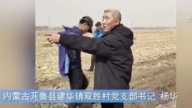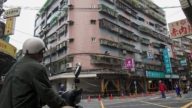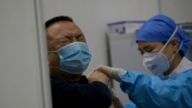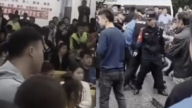【新唐人2013年07月19日訊】中共國務院今年組建「新聞出版廣播電影電視總局」,中共黨媒週四公布了新的電影審查制度,其中「一般性劇本」審查將被取消,而其他出版、影視、新聞等領域,也釋放不同程度的監管權力。不過,這項所謂的新規定,2006年早已出臺。業內人士認為,中共面臨日益嚴重的經濟危機,而想利用文化市場刺激經濟,增加GDP,所以才「舊規」重提。
7月17號,大陸媒體公布了「新聞出版廣電總局」機構和人員的編製規定,其中列出了21條要「取消的職能」、8項職能下放事項、以及7項職能加強事項。
今年3月,中共新領導班子上臺後,進行所謂國務院大部制改革,重新整合後的「新聞出版廣電總局」的職責也作出相應調整。在「取消的職能」中,包括取消一般題材的電影劇本審查,實行梗概公示。
實際上,這項規定在2006年6月22號實施的「電影劇本備案、電影片管理規定」中已有規定。但多年來,中共對電影的審查卻沒有絲毫放鬆。
北京藝術家、獨立製片人楊偉東因拍攝大型記錄片《需要》,而遭到中共當局的長期打壓。
北京藝術家、獨立製片人楊偉東:「它就說我採訪了很多敏感的人,說我們的訪談殃及影響到國家和政治的安全。它審查了我至少將近兩年了,甚麼結果也沒有。」
今年47歲的楊偉東,從2008年開始,將近3年時間,採訪了大約260名中國社會各界的人士,他希望透過訪談和記錄片形式,反映社會的價值觀,和人們對信仰、自由的看法。
而最近的規定說「取消一般題材電影劇本審查,實行梗概公示」究竟甚麼是一般題材?甚麼是特殊或敏感題材?對此,中共並沒有一個明確的界定。
楊偉東:「它沒有標準嘛,假使就是說,只要它涉及到它自己的利益的時候,它就說這個是敏感的(題材)。」
中共當局對電影導演的打壓、及電影題材的審查由來已久,大陸導演無不深受其害,敢怒不敢言。對於這項「舊規」重提,各界反應不一。
大陸詩人和文化評論家葉匡政指出,取消劇本審查這一點,看似寬鬆,但在審查成片時如果發生爭議,導演更無據可依了。
大陸詩人、文化評論家葉匡政:「並不是說它每一個審查禁令都是由某一個人,或者某一個最高長官,然後它經過系統周密的考查或者認證得出來的,但是因為一個禁令要出來的話,你必須要平衡各方意見,它可能就最後成了一個就大家不知道它背後究竟是甚麼邏輯。」
中國詩人李南:「我估計是,可能是有幾股勢力,完了以後互相妥協的結果。」
在中國,常年在中共嚴酷的電影審查制度下,敢於揭露真相的導演已不多,許多導演為了生存,早就習慣了自律。
原《河北人民廣播電臺》編輯朱欣欣:「中國的文化市場表面上看,轟轟烈烈很熱鬧,實際上質量低下,題材重復,都擁擠在很狹窄的範圍內,同時也束縛了廣大的文學藝術創造者的才能、才智得不到發揮,觀眾又不滿意,這樣的市場它必然是畸形的和萎縮的。」
六四前夕,北京的《紐約時報》特約攝影記者杜斌,因拍攝揭露遼寧「馬三家女子勞教所」酷刑的記錄片《小鬼頭上的女人》及《天安門屠殺》一書,被中共以「涉嫌擾亂公共場所秩序」的罪名關押。目前,杜斌被取保候審。
對於這次「舊規」重提,朱欣欣認為,目前中共面臨著嚴重的經濟危機,想利用文化市場刺激一下經濟,增加GDP,但是,對於當局認為的敏感題材一樣還會被審查。
採訪編輯/李韻 後製/陳建銘
———————————————
Screenplay Censorship Cancellation: Old Wine In a New Bottle
China’s State Council has reconstructed its State Administration of Radio, Film and Television (SARFT). A new film censorship regulation was announced on July 18. Censorship for “general-topic” film scripts is cancelled.
In other fields including publishing, TV, and journalism, censorship is also lifted, to some extent. However, the cancellation is actually putting old wine into a new bottle, which existed as early as in 2006. Cultural professionals speculate that the Chinese Communist Party (CCP) authorities are trying to revitalize an ailing economy, by appearing to relax cultural market constraints.
On July 17, a new regulation on SARFT administration and function adjustment was officially released. It cancels 21 original functions of the SARFT, and decentralizes another eight.
Back in March, the CCP new administration initiated a Big-Ministry Reconstruction. The role of the newly formed SARFT has changed accordingly. Now only film synopses, instead of full scripts, have to be submitted for film shooting approval.
However, an earlier regulation on screenplay registration, and film administration, recorded the same content, which took effect in June 2006. Since then, film censorship by the CCP authorities has never been relaxed in practice.
Yang Weidong, Beijing independent filmmaker, has been suppressed for years by the CCP. He had shot a large-scale documentary film —— “The Need".
Yang Weidong: “CCP authorities accused me of affecting national and political security negatively, since I had interviewed lots of “sensitive” figures. The censorship has lasted for nearly two years, but I still have no result.”
Yang, aged 47, has interviewed about 260 people from all sectors of China’s society since 2008. He wants, by means of interviews and documentary film, to reflect social values, and to report on people’s views on faith and freedom.
But what is a “general” topic? And what is a “non-general” topic? Neither of these two categories has been clearly defined by the authorities.
Yang Weidong: “There’re no clear criteria available. If the film violates CCP interests, it will just be put into a sensitive-category, and censored."
The CCP’s suppression of film makers and its censorship of film have long existed in China. Most mainland filmmakers have always suffered in silence. So far, this “old wine in a new bottle” has sparked different reactions.
Ye Kuangzheng, cultural critic and poet in China, says it seems to lift a ban on scripts’ censorship. Yet, when a dispute arises during film censorship, producers had no traceable criteria to rely upon.
Ye Kuangzheng: “It doesn’t mean that rule of the censorship based on the censors’ systematic thinking or examination. In fact, when an order of censorship issued, you need to balance the views of all parties, finally, the approved scenes often lose implicit logical links.”
(Poet, China) Li Nan: “I think this may be a compromise by several different parties.”
In China, under the harsh film censorship system, there have been very few truth-telling directors. In order to survive, many directors have been forced to accustom themselves to self-discipline.
(ex-editor, Hebei state radio) Zhu Xinxin: “Outwardly, China’s cultural market is quite vigorous. Actually it’s full of products of poor quality and topical repetition. Room for creativity is very limited, and neither are audiences satisfied. Such a market is warped and bound to be contracted. “
On the eve of June 4th, Du Bin, freelance photographer with the New York Times, was detained in China. He was the director of a documentary film, “Wowem Above Ghosts’ Heads”, and the author of a book, “Tiananmen Massacre”. The CCP authorities have charged him with “suspicion of disturbing public order”. Currently, Du Bin has been released on bail.
Zhu Xinxin comments on the CCP’s “new-bottle” announcement of the cancellation of film script censorship. It is to stimulate the economy by appearing to relax constraints on the cultural market, Zhu says. Whilst films on sensitive topics will still be censorship candidates, Zhu believes.




























